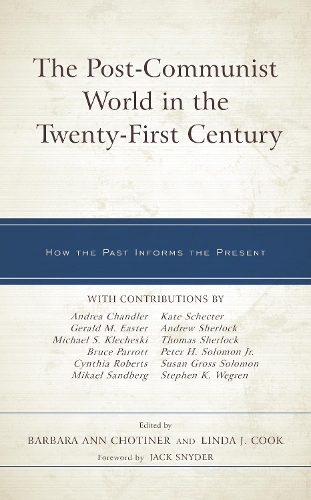
The Post-Communist World in the Twenty-First Century: How the Past Informs the Present
(Hardback)
Publishing Details
The Post-Communist World in the Twenty-First Century: How the Past Informs the Present
By (Author) Barbara Ann Chotiner
Edited by Linda J. Cook
Contributions by Andrea Chandler
Contributions by Barbara Ann Chotiner
Contributions by Linda J. Cook
Contributions by Gerald M. Easter
Contributions by Michael S. Klecheski
Contributions by Bruce Parrott
Contributions by Cynthia Roberts
Contributions by Mikael Sandberg
Bloomsbury Publishing PLC
Lexington Books
28th June 2022
United States
Classifications
Professional and Scholarly
Non Fiction
Left-of-centre democratic ideologies and movements
International relations
320.532
Physical Properties
Hardback
328
Width 160mm, Height 228mm, Spine 24mm
608g
Description
The Postcommunist World in the Twenty-First Century presents studies by senior scholars and practitioners that are highly relevant to contemporary political challenges. The democratic vision that accompanied the collapse of communist regimes in the Soviet Union and East Central Europe has been replaced by a range of authoritarian, semi-authoritarian and democratic regimes, and growing division between Western and Russian influence. Russias invasion of Ukraine has led to renewed tensions and international crisis. China, which presents major challenges to the US, Europe, and the global order, has emerged as a critical actor in the international conflict. The need to understand the internal dynamics and international behavior of communist and authoritarian regimes is more urgent at this time. The expertise provided by the volumes contributors is especially timely, offering new insights into the past and contemporary politics of these states, the agendas driving their behavior, regimes domestic strengths and weaknesses, and the role of leaders differing perceptions in exacerbating international conflict. Practitioners demonstrate how such knowledge can inform effective policy and ameliorative efforts.
Reviews
Seweryn Bialer would be proud. His distinguished former students have produced a posthumous Festschrift that is intellectually coherent, rigorous in its scholarship, novel in its interpretations, and yet highly readable. The chapters cover a wide range of topics in the domestic and foreign policies of Russia, post-communist states, and authoritarian regimes more generally. A welcome contribution is made by chapters that focus on the careers of Bialer's students who did not enter academia, but instead worked in the diplomatic and NGO realms. Also welcome are stimulating chapters that focus on issues of public health and legal questions that are not usually discussed in books on "high" politics. Specialists will learn a great deal from this stimulating volume.
-- George Breslauer, University of California, BerkeleyThe Post-Communist World in the Twenty-First Century consists of provocative essays by distinguished former students of the great Sovietologist Seweryn Bialer. Touching as they do on different aspects of Soviet and post-Soviet life, together the essays faithfully reflect Bialers wide range of interests and expertise, the perceptiveness and creativity of his scholarship, his ability to bring the lessons of the past to bear on the problems of the present and the future, and his capacity for using both history and the social sciences to analyze the issues that mattered most for Russia and the rest of the world.
-- Michael Mandelbaum, author of The Four Ages of American Foreign Policy: Weak Power, Great Power, Superpower, HyperpowerThis book is a wonderful tribute to one of the most important scholars of the Soviet system. Weaving together significant historical, political, and social analysis, it provides insights into a range of topics bearing on current debates including military doctrine, political succession, Russias relations with the West, populism, the nature of elite politics, public health, food security, and refugees. And it provides those of us who did not have the good fortune to study directly with Dr. Seweryn Bialer a deeper understanding of his importance to his students and colleagues.
-- James Goldgeier, American UniversityAuthor Bio
Barbara Ann Chotiner is professor emerita of political science at The University of Alabama.
Linda J. Cook is professor emerita of political science and Slavic studies at Brown University.
